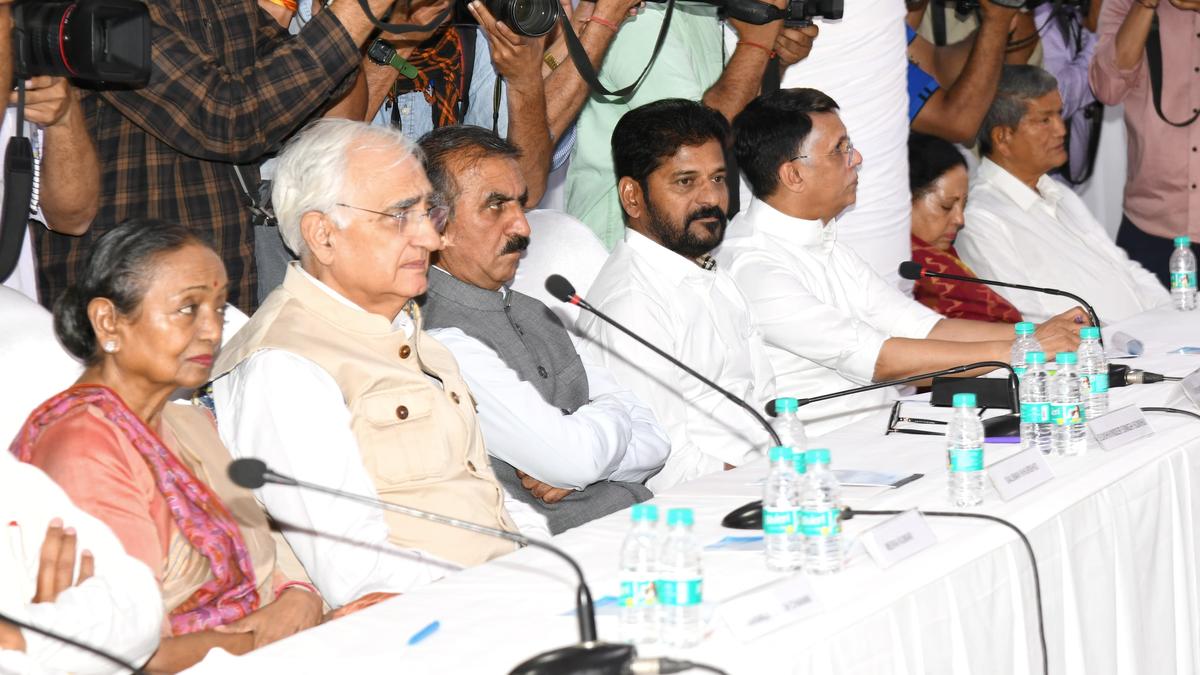 |
|
The Congress Working Committee (CWC), the highest decision-making body of the All India Congress Committee, has formally acknowledged and appreciated the Telangana government's approach to conducting a caste census, specifically targeting the Backward Classes (BC). This endorsement, articulated in a resolution passed during a CWC meeting in New Delhi, signifies a significant political development with potential national implications. The CWC's resolution explicitly praises the “scientific way” in which the Telangana government conducted its BC caste survey, highlighting its transparent process and the inclusive consultation with various stakeholders. The demand from the CWC that the Central Government adopt the Telangana model for the general census underscores the growing political pressure to incorporate caste as a key demographic factor in national policy-making. The Telangana model appears to have resonated within the Congress party, with senior leaders publicly commending its methodology and potential for broader application across the country. Jairam Ramesh, Sachin Pilot, Bhupesh Baghel, and Saptagiri Sankar Ulaka, among others, used the occasion of a press conference to extol the virtues of the Telangana survey, amplifying its visibility on the national stage. The CWC discussion on social justice, as reported, centered significantly on the Telangana survey, suggesting that the party sees it as a viable and effective mechanism for addressing historical inequalities and ensuring more equitable resource allocation. This focus highlights a strategic shift within the Congress party towards embracing caste-based affirmative action and potentially repositioning itself as a champion of social justice issues, particularly concerning the Backward Classes. Furthermore, the remarks made by Jairam Ramesh, specifically targeting Prime Minister Narendra Modi's 'Chappan Inch Chathi' (56-inch chest) statement, introduce a layer of political antagonism and rivalry. By contrasting the perceived authenticity and depth of the 56 questions in the Telangana survey questionnaire with what he implies is superficial rhetoric, Ramesh uses the Telangana model as a point of comparison to critique the Modi government's policies and perceived lack of commitment to social justice issues. This political jousting underscores the potentially contentious nature of the caste census issue and its susceptibility to partisan exploitation. The enthusiastic endorsement of the Telangana model by Congress leaders and the CWC further strengthens Chief Minister A. Revanth Reddy's political capital, both within the state of Telangana and at the national level. His subsequent post on 'X' (formerly Twitter), expressing pride in Telangana's role as a model for a 'great social revolution,' showcases his intent to leverage this achievement for political gain and solidify his position as a progressive leader. By highlighting the transparency and rigor of the caste census process in Telangana, Reddy aims to project an image of good governance and social inclusivity, potentially attracting support from marginalized communities and progressive voters. The call by Saptagiri Sankar Ulaka for the formation of a Cabinet sub-committee to develop a similar questionnaire, incorporating stakeholder input, further demonstrates the desire to institutionalize and replicate the Telangana model at the national level. This proposal suggests a concrete pathway for implementing a nationwide caste census and underscores the urgency with which some Congress leaders view the issue. The broader implications of a national caste census based on the Telangana model extend beyond mere data collection. It has the potential to reshape the landscape of Indian politics and society by influencing policy decisions related to education, employment, and resource allocation. Accurate caste data can inform targeted interventions aimed at addressing historical disadvantages and promoting social mobility for marginalized communities. However, it also raises concerns about potential social divisions, the accuracy and reliability of data, and the politicization of caste identities. The Telangana government’s approach, with its emphasis on scientific methodology and stakeholder consultation, aims to mitigate some of these risks. It remains to be seen whether the Central Government will heed the CWC's call and adopt the Telangana model for the general census. The decision will likely be influenced by a complex interplay of political considerations, bureaucratic hurdles, and legal challenges. Nevertheless, the CWC's endorsement of the Telangana model has elevated the caste census issue to the national stage and intensified the pressure on the government to take decisive action. The outcome of this debate will have far-reaching consequences for Indian society and politics.
Source: CWC appreciates Telangana for ‘showing the way to the nation on caste census’
